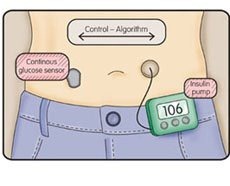The Juvenile Diabetes Research Foundation (JDRF) said last month it was teaming up with U.S. drugmaker Johnson & Johnson’s unit Animas, which makes insulin pumps, and DexCom Inc, which makes continuous glucose monitoring devices, to develop and test an artificial pancreas system in Type 1 diabetics.
In type 1 diabetes, the pancreas does not produce insulin. Insulin is a hormone that is involved in regulating how the body converts sugar (glucose) into energy. People with type 1 diabetes need to take daily insulin shots and carefully monitor their blood glucose levels.
Type 1 diabetes is less common that type 2 diabetes. This type of diabetes can occur at any age, but usually first develops in childhood or adolescence. Type 1 diabetes accounts for 5 – 10% of all diabetes cases.
The Cambridge study, published in The Lancet medical journal on Friday, used devices and sensors from Smiths Medical, a unit of Smiths Group, Abbott Diabetes Care, a unit of Abbott Laboratories, and Medtronic.
 The ultimate goal is to create a device that can check patients blood day and night, during and between meals, and deliver insulin as required.
The ultimate goal is to create a device that can check patients blood day and night, during and between meals, and deliver insulin as required.
The Cambridge study found their device performed better than a conventional pump, which delivers insulin at pre-set rates and which kept blood sugar levels around normal for 40 percent of the time compared with 60 percent for the artificial pancreas.
This is of particular interest to parents of small children. "Many parents are up every night to test their child’s blood sugar, and many live with the fear that their child won’t wake up in the morning," said Aaron j. Kowalski of the juvenile diabetes research foundation, stressing that the device helps lower nighttime hypoglycemic attacks.
Apart from hypoglycemic attacks, insulin stacking — a condition which occurs after children go to bed after eating a large evening meal — was less frequent in children, who used the new device.
"This is an important step forward in managing overnight blood glucose levels as well as in the eventual development of a full ‘artificial pancreas’ which could vastly improve the quality of life for people with type 1 diabetes and reduce the risk of the associated complications," said research manager Victoria King.
SOURCE: ‘Artificial Pancreas’ a Step Nearer for Children With Type 1 Diabetes
Continue reading “Test of "Artificial Pancreas" Offers Type 1 Diabetics Hope”